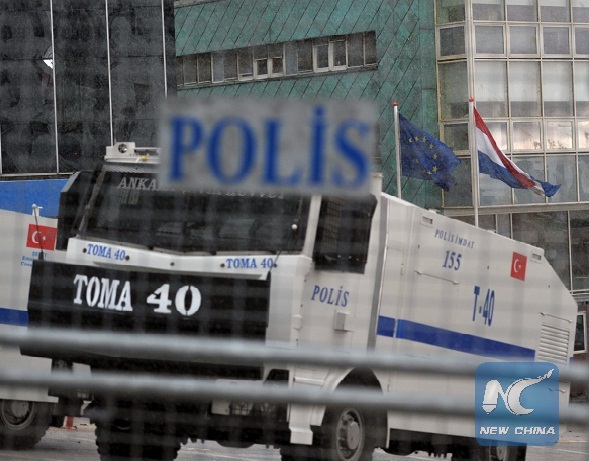
A Turkish police vehicle is seen outside Dutch Embassy in Ankara, Turkey, March 12, 2017. Some 150 to 200 people holding Turkish national flags gathered in front of Dutch Embassy in Ankara on March 11 to protest Dutch bans on Turkish politicians from holding rallies in Netherlands ahead of April 16 constitutional referendum. (Xinhua/Mustafa Kaya)
BRUSSELS, March 13 (Xinhua) -- The European Union (EU) Monday frowned at Turkey's constitutional reforms referendum to grant greater powers to President Recep Tayyip Erdogan, amid tensions between Turkey and some EU member states over Turkish ministers' campaigning.
In a joint statement, EU foreign policy chief Federica Mogherini and Commissioner for enlargement negotiations Johannes Hahn conceded that Turkey "has the sovereign right to decide over its system of governance".
However, citing the Venice Commission's opinion on the amendments to Turkey's Constitution released on March 10, they stressed that the proposed amendments raised serious concerns about the excessive concentration of powers in one office, especially the necessary checks and balances and the independence of the judiciary.
"It is also of concern that this process of constitutional change is taking place under the state of emergency (in the country)," they said.
The Venice Commission is an advisory body of the Council of Europe (CoE) in the field of constitutional law. The CoE is the continent's leading human rights organization which consists of 47 member states, including Turkey.
"The proposed amendments, if approved at the referendum of April 16, and especially their practical implementation, will be assessed in light of Turkey's obligations as an EU candidate country and as a member of the CoE," they said, adding that Turkey should address the CoE's -- and other bodies -- concerns and recommendations.
Regarding recent tensions between Turkey and some EU member states, they underlined that it was essential to avoid further escalation and to find ways to diffuse the tension surrounding the current situation.
"Decisions with regard to the holding of meetings and rallies in member states are a matter for the member state concerned," they said.
Turkey was called on to refrain from using excessive statements and actions that would risk further exacerbating the situation.
"Matters of concern can only be resolved through open and direct communication channels," they added.
Fueled by the latest strongly-worded controversial remarks made by Erdogan, tensions are feared to escalate and spread from a rally row between Turkey and the Netherlands in the former's relations with other EU members.
Erdogan on Sunday warned the Netherlands it would pay for barring Turkish ministers from campaigning on its land, saying it was acting like a "banana republic".
He also said "Nazism is still widespread in the West" in reference to the Dutch treatment of Turkish ministers.
In response, Dutch Prime Minister Mark Rutte called Erdogan's remarks totally unacceptable and irresponsible.
The row has also led to the delay of a planned visit by Turkish Prime Minister Binali Yildirim this month by Denmark's Prime Minister Lars Lokke Rasmussen.
Later, during a speech in France, Turkey's foreign minister Melvut Cavusoglu described the Netherlands as the "capital of fascism" and criticized it for joining other European countries in banning Turkish ministers campaigns.
France, urging calm, said it saw no reason to ban his gathering.
German Chancellor Angela Merkel has vowed to prevent Turkey's political tensions from spreading into Germany. Some local authorities in Germany, Austria, and Switzerland called off Turkish rallies.
Turkey will hold a constitutional referendum on April 16, which could bring drastic changes to the country's political system, including a shift to an executive presidential system from the current parliamentary system.
The Turkish referendum will ask the electorate to vote "yes" or "no" to the changes proposed in an 18-article bill.
On Dec. 30, 2016, a constitutional committee of deputies from Turkey's ruling Justice and Development Party (AKP) and the opposition Nationalist Movement Party (MHP) submitted a proposed bill to Parliament for ratification.
The parliament passed the constitutional amendment on Jan. 21 in two rounds of voting. A total of 339 deputies voted in favor of the amendment, exceeding the 330-vote threshold to bring it to a referendum.

